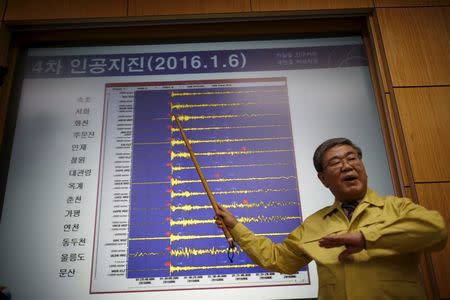After nuclear test, U.N. readying new measures against North Korea

By Louis Charbonneau and Michelle Nichols UNITED NATIONS (Reuters) - The U.N. Security Council said on Wednesday it would begin working immediately on significant new measures in response to North Korea's fourth nuclear test, a threat diplomats said could mean an expansion of U.N. sanctions against Pyongyang. North Korea said it successfully tested a miniaturised hydrogen nuclear bomb on Wednesday. Atomic weapons experts cast doubt on the isolated nation's ability to make such an advance, but the test rang international alarm bells. "The members of the Security Council ... recalled that they have previously expressed their determination to take 'further significant measures' in the event of another DPRK (North Korea) nuclear test," Uruguay's U.N. ambassador, Elbio Rosselli, president of the council this month, told reporters. "In line with this commitment and the gravity of this violation, the members of the Security Council will begin to work immediately on such measures in a new Security Council resolution," he said, calling the test "a clear violation of Security Council resolutions." Rosselli spoke after an emergency council session requested by the United States, Japan and South Korea. U.S. Ambassador Samantha Power said in a statement the 15-nation council should impose "a tough, comprehensive, and credible package of new sanctions," and ensure "rigorous enforcement of the resolutions it has already adopted." U.N. Secretary-General Ban Ki-moon called North Korea's latest nuclear test "deeply troubling" and "profoundly destabilising for regional security." "This test once again violates numerous Security Council resolutions despite the united call by the international community to cease such activities," the United Nations chief, a former South Korean foreign minister, told reporters. Japanese Foreign Minister Fumio Kishida told reporters: "We plan to work with other countries so that a resolution with strong content can be adopted at the U.N. Security Council as swiftly as possible." Japan is a member of the council for the next two years. Russia's U.N. ambassador, Vitaly Churkin, told reporters Moscow was calling for "cool heads" and a "proportionate response" to the nuclear test. Several Western diplomats said that if the latest North Korean nuclear test was confirmed, the United States, European council members and Japan would seek to expand existing U.N. sanctions against Pyongyang. Pyongyang has been under U.N. sanctions because of its nuclear weapons program since it first tested an atomic device in 2006. The U.N. blacklist includes 20 entities and 12 individuals, as well as an international ban on the export of luxury goods and missile and nuclear technology to North Korea. Individuals are barred from international travel and the assets of all entities and persons on the blacklist are to be frozen. One senior Western diplomat said possible additions to the U.N. sanctions list could be foreign representatives of the North Korean organisation that administers its nuclear developments and people linked to one of its key procurement companies. "All of this depends on the appetite of the council, particularly the Chinese position," he said. "There are more things we could do in terms of listing more people, brokers and intermediaries, broaden out the circle of people on the list." Traditionally, China has supported the expansion of sanctions against its ally and neighbour North Korea over nuclear tests and missile launches, although it has pushed hard to ensure the measures are not what it considers excessively harsh. (Reporting by Louis Charbonneau and Michelle Nichols; Editing by Howard Goller and Peter Cooney)

